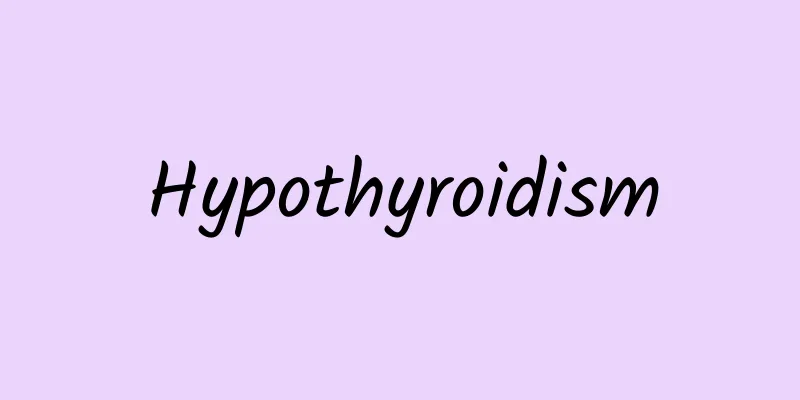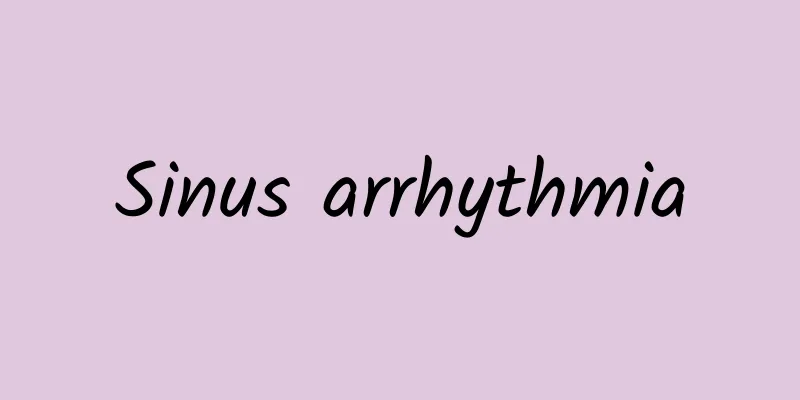Hypothyroidism

|
Hypothyroidism is a physiological or even systemic disease caused by insufficient thyroid secretion. Women are at a high risk of hypothyroidism. The onset of hypothyroidism will have a great impact on the patient's physical and mental health, and the probability of hypothyroidism will become more and more obvious with increasing age. Hypothyroidism is very harmful. So what are the symptoms of hypothyroidism? Or what are the factors that cause this disease? What are some good ways to prevent and treat this disease in daily life? Hypothyroidism (referred to as hypothyroidism) is a systemic disease caused by insufficient synthesis and secretion of thyroid hormones, or poor physiological effects of thyroid hormones. If the functional decline begins in the fetal or neonatal period, it is called cretinism; if it begins in children before sexual development, it is called juvenile hypothyroidism; if it begins in adults, it is called adult hypothyroidism. Hypothyroidism is more common in women than in men, and its prevalence increases with age. The incidence of hypothyroidism in newborns is about 1/7000. The incidence decreases during adolescence and increases after adulthood. The most common cause of hypothyroidism is chronic lymphocytic thyroiditis.Overview Primary hypothyroidism (HIV) is the most common type and is probably an autoimmune disorder that usually occurs as a result of Hashimoto's thyroiditis and is often associated with a firm thyroid enlargement and later, as the disease progresses, a shrunken fibrous thyroid gland with little or no function. The second most common type is hypothyroidism after treatment, especially radioactive iodine and surgical treatment of hyperthyroidism. Propylthiouracil, methimazole, and iodine are used to overtreat hypothyroidism, which often recovers after treatment is stopped. Mild hypothyroidism is common in older women. Most patients with non-Hashimoto's goiter have normal thyroid function or hyperthyroidism, but goiter and hypothyroidism can occur in patients with endemic goiter. Iodine deficiency will reduce the synthesis of thyroid hormones and the release of TSH. Under the stimulation of TSH, the thyroid gland will enlarge and the iodine absorption will increase significantly, leading to thyroid enlargement. If the iodine deficiency is severe, the patient will develop hypothyroidism, but since the advent of iodized salt, this disease has been virtually eliminated in the United States. Endemic cretinism is the most common cause of congenital hypothyroidism in iodine-deficient areas and a major cause of mental disorders worldwide. Rare hereditary enzyme deficiencies can impair thyroid hormone synthesis and cause goiter and hypothyroidism. Secondary hypothyroidism occurs when there is a lack of TRH secretion from the hypothalamus, failure of the hypothalamic pituitary axis, or a lack of TSH secretion from the pituitary. Posterior view of the thyroid gland Acid, through the action of oxidase, couples MIT and DIT to form thyroxine (T4), and MID and DIT to form triiodothyronine (T3), which are stored in the colloid cavity. After the synthesized thyroxine (T4) and triiodothyronine (T3) are secreted into the blood circulation, they mainly bind to thyroxine binding globulin (TBG) in plasma to facilitate the transport and regulation of the concentration of thyroxine in the blood. Thyroxine (T4) is deiodinated in peripheral tissues to form biologically active T3 and biologically inactive rT3. The deiodinated iodine can be reused. Therefore, in hyperthyroidism, blood T4, T3 and rT3 are all increased, while in hypothyroidism, all three are lower than normal. The secretion of thyroxine is regulated by pituitary cell secretion and TSH through the adenylate cyclase-cAMP system. TSH is controlled by TRH secreted by the hypothalamus, thus forming the hypothalamus-pituitary-thyroid axis to regulate thyroid function. The capsule and adjacent thyroid glands. The thyroid gland has two capsules: the pretracheal fascia surrounds the thyroid gland to form the thyroid sheath, which is called the thyroid false capsule; the outer membrane of the thyroid gland itself extends into the glandular substance, dividing the gland into several lobules, namely the fibrous capsule, also known as the true thyroid capsule. The gap between the glandular sheath and the fibrous capsule contains loose connective tissue, blood vessels, nerves and parathyroid glands. When the thyroid gland is separated surgically, it should be performed in this gap and avoid damaging structures that should not be damaged. At the upper end of the left and right lobes of the thyroid gland, the false capsule thickens and connects to the thyroid cartilage, which is called the thyroid suspensory ligament; the false capsule on the inner side of the left and right lobes and behind the thyroid isthmus fuses with the perichondrium of the cricoid cartilage and the tracheal cartilage ring to form the lateral thyroid ligament. The above ligaments fix the thyroid gland to the larynx and tracheal wall. Therefore, when swallowing, the thyroid gland can move up and down with the larynx, which is the basis for judging whether the thyroid gland is enlarged. The recurrent laryngeal nerve often passes behind the lateral thyroid ligament and suspensory ligament. When handling the above ligaments during thyroid surgery, be careful to avoid damaging the recurrent laryngeal nerve. The front of the thyroid gland is lined with skin, superficial fascia, superficial cervical fascia, infrahyoid muscles and pretracheal fascia from shallow to deep. The posteromedial side of the thyroid lobe is adjacent to the larynx and trachea, pharynx and esophagus, and recurrent laryngeal nerve, and its posterolateral side is adjacent to the carotid sheath and the common carotid artery, internal jugular vein and vagus nerve in the sheath, as well as the cervical sympathetic trunk located deep in the prevertebral fascia. When the thyroid gland is enlarged, if it is pressed inwardly, breathing and swallowing difficulties and hoarseness may occur. If the sympathetic trunk is pressed posteriorly and outwardly, HORNER syndrome, pupil constriction, ptosis and enophthalmos may occur. Causes The cause of the disease is relatively complex, with primary being the most common, followed by pituitary, and the others being rare. Symptoms 1. Pale complexion, puffy eyelids and cheeks, apathetic expression, dementia, dry, thickened, rough and scaly skin all over the body, non-pitting edema, hair loss, sallow hands and feet, weight gain, and a few patients have thick and brittle nails. 2. Neuropsychiatric system: memory loss, mental retardation, drowsiness, slow reaction, anxiety, dizziness, headache, tinnitus, deafness, nystagmus, ataxia, slow tendon reflexes, prolonged Achilles tendon reflex time. In severe cases, dementia, stupor, and even coma may occur. 3. Cardiovascular system: bradycardia, decreased cardiac output, low blood pressure, dull heart sounds, enlarged heart, and coronary heart disease may occur, but angina pectoris and heart failure generally do not occur. Sometimes it may be accompanied by pericardial effusion and pleural effusion. Severe cases may develop myxedema cardiomyopathy. 4. Digestive system: anorexia, abdominal distension, constipation. In severe cases, paralytic ileus may occur. The gallbladder contraction weakens and becomes enlarged, and half of the patients suffer from gastric acid deficiency, leading to pernicious anemia and iron deficiency anemia. The above is a brief introduction to some symptoms, causes, and other common sense issues of hypothyroidism. Finally, I would like to remind you that if you have pale complexion, memory loss, or some changes in the cardiovascular system, it is best to go to the hospital to check whether you have hypothyroidism, so as to better reduce the incidence of this disease. |
Recommend
True and false pictures of wild Gastrodia elata
Wild Gastrodia elata is smaller and uneven in siz...
A bad mood is harmful to your health! Acupoint massage heals "emotional trauma"
People always have emotions such as sadness, ange...
How are warts formed?
Warts are mainly growths on the skin surface caus...
The efficacy, effects and contraindications of Qianjinba
Eupatorium sphaerocephala is the root of the legu...
What should I do if I have yellow tongue coating and bad breath?
Bad breath is a big problem for many people. It m...
What to drink to relieve heat
According to TCM theory, getting "hot" ...
Can asthma patients eat fish?
Fish is a common meat in our daily life. It has l...
What is the incubation period of herpes? What are the symptoms of the incubation period?
Herpes is a highly contagious and common disease....
Are birth control pills effective for weight loss?
In order to control weight and maintain a good fi...
Taboos of soaking tangerine peel and Poria cocos in water
Poria cocos is a common Chinese medicinal materia...
Urethral malformation
Urethral malformation is a male disease, which is...
Side effects of ginseng
Yaogui ginseng is a kind of wild ginseng. It is a...
Why does my baby cry suddenly at night?
For babies, crying at night is quite common. This...
There are water drops and black spots after applying Ai Ai
Some people will have water droplets on the place...
What is the cause of hypertrophic pharyngitis?
Hypertrophic pharyngitis occurs very often, and i...









